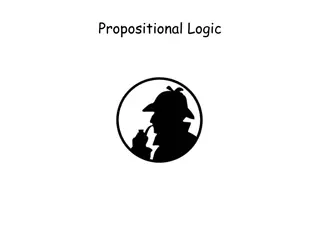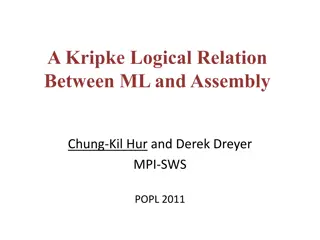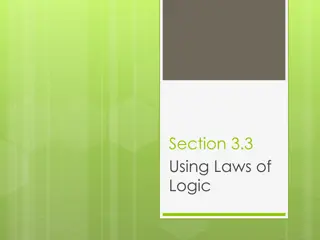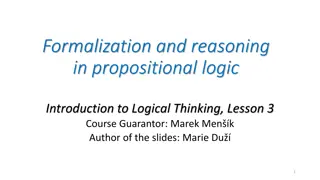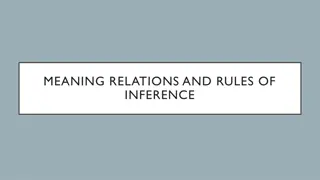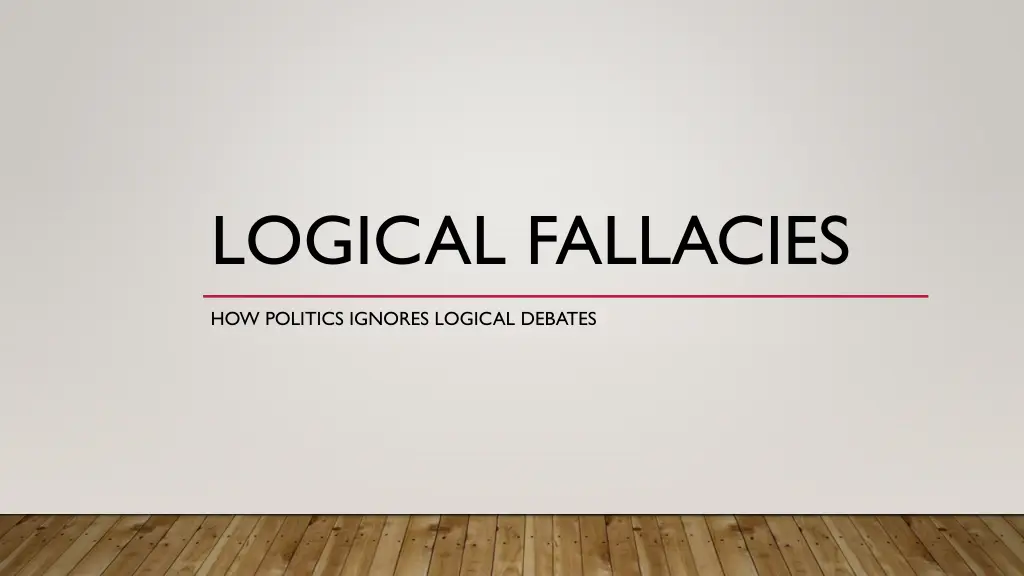
Politics and Logical Fallacies: Debunking Common Misconceptions
Explore how politics often sidesteps logical debates by employing common fallacies such as ad hominem attacks, straw man arguments, black-and-white fallacies, hasty generalizations, and false dilemmas. Understand the implications of these flawed reasoning tactics in political discourse.
Download Presentation

Please find below an Image/Link to download the presentation.
The content on the website is provided AS IS for your information and personal use only. It may not be sold, licensed, or shared on other websites without obtaining consent from the author. If you encounter any issues during the download, it is possible that the publisher has removed the file from their server.
You are allowed to download the files provided on this website for personal or commercial use, subject to the condition that they are used lawfully. All files are the property of their respective owners.
The content on the website is provided AS IS for your information and personal use only. It may not be sold, licensed, or shared on other websites without obtaining consent from the author.
E N D
Presentation Transcript
LOGICAL FALLACIES HOW POLITICS IGNORES LOGICAL DEBATES
LOGICAL FALLACIES What is a logical fallacy? A logical fallacy is an error in reasoning common enough to warrant a fancy name.
AD HOMINEM FALLACY Ad hominem is Latin for against the man. More specifically,ad hominems are a fallacy of relevance where someone rejects or criticizes another person s view on the basis of personal characteristics, background, physical appearance, or other features irrelevant to the argument at issue. Examples: doozies against Hillary Clinton: Killary Clinton, "Crooked Hillary, Examples: Short fingered Vulgarian, "Angry Creamsicle," "Fascist Carnival Barker,"
STRAW MAN FALLACY Straw man is any time ignorance is used as a major premise in support of an argument, it s liable to be a fallacious appeal to ignorance. Example: No one has ever been able to prove definitively that extra-terrestrials exist, so they must not be real. No one has ever been able to prove definitively that extra- terrestrials do not exist, so they must be real.
BLACK-AND-WHITE FALLACY, black-and-white fallacy, either-or fallacy, false dichotomy, and bifurcation fallacy. This line of reasoning fails by limiting the options to two when there are in fact more options to choose from. Examples: "there are only two kinds of people in the world, people who love Led Zeppelin, and people who hate music. The false dilemma fallacy is often a manipulative tool designed to polarize the audience, heroicizing one side and demonizing the other. It s common in political discourse as a way of strong-arming the public into supporting controversial legislation or policies.
HASTY GENERALIZATIONS Hasty generalizations are general statements without sufficient evidence to support them. They are general claims too hastily made, hence they commit some sort of illicit assumption, stereotyping, unwarranted conclusion, overstatement, or exaggeration. Example: People nowadays only vote with their emotions instead of their brains.
FALSE DILEMMA The slippery slope fallacy works by moving from a seemingly benign premise or starting point and working through a number of small steps to an improbable extreme. Example: If America doesn t send weapons to the Syrian rebels, they won t be able to defend themselves against their warring dictator. They ll lose their civil war, and that dictator will oppress them, and the Soviets will consequently carve out a sphere of influence that spreads across the entire Middle East.
RED HERRING A red herring is a distraction from the argument typically with some sentiment that seems to be relevant but isn t really on-topic. Typically, the distraction sounds relevant but isn t quite on-topic. This tactic is common when someone doesn t like the current topic and wants to detour into something else instead, something easier or safer to address. (Hard one to identify because it s not always clear how different topics relate) Example:
YOU TOO The tu quoque, Latin for you too, is also called the appeal to hypocrisy because it distracts from the argument by pointing out hypocrisy in the opponent. This tactic doesn t solve the problem, or prove one s point, because even hypocrites can tell the truth. Focusing on the other person s hypocrisy is a diversionary tactic. Example: Maybe I committed a little adultery, but so did you Jason! Jack is trying to diminish his responsibility or defend his actions by distributing blame to other people.
FALSE CAUSE Post Hoc fallacy.Post hoc is short for post hoc ergo propter hoc ("after this, therefore because of this"). This fallacy happens when you mistake something for the cause just because it came first. The key words here are Post and propter meaning after" and "because of." Just because this came before that doesn t mean this caused that. Example: Yesterday, I walked under a ladder with an open umbrella indoors while spilling salt in front of a black cat. And I forgot to knock on wood with my lucky dice. That must be why I m having such a bad day today. It s bad luck.
APPEAL TO EMOTIONS Argumentum ad misericordiam is Latin for argument to compassion". Like the ad hominem fallacy above, it is a fallacy of relevance. Personal attacks, and emotional appeals, aren t strictly relevant to whether something is true or false. In this case, the fallacy appeals to the compassion and emotional sensitivity of others when these factors are not strictly relevant to the argument. Example: How can you eat that innocent little carrot? He was plucked from his home in the ground at a young age, and violently skinned, chemically treated, and packaged, and shipped to your local grocer and now you are going to eat him into oblivion when he did nothing to you. You really should reconsider what you put into your body.








